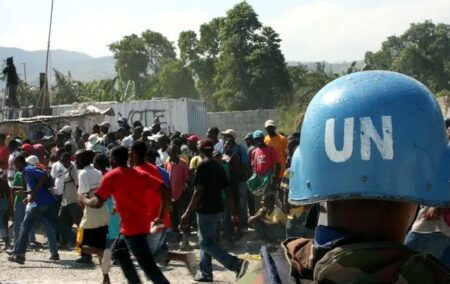Gang violence in Haiti caused 1 660 deaths and 850 injuries in the first three months of the year – a more than than 50% increase on the previous quarter’s figures, according to the latest quarterly UN report on the beleaguered island state.
The United Nations Integrated Office in Haiti (BINUH) reported 1 104 deaths and 532 injuries in the previous quarter.
Deutsche Welle reports that Haiti’s gangs have started targeting law enforcement more directly, with police operations in turn becoming more lethal.
The UN report says that almost four in every five of the deaths or injuries (79%) took place in the lawless capital Port-au-Prince, as authorities struggle to retain control.
The report says that in addition to the major prison breaks orchestrated by Port-au-Prince gangs when ‘more than 4 600 inmates escaped from the two main prisons in the capital’, at least 22 police facilities have been looted or set on fire, with 19 police officers killed or injured during the first three months of the year.
Haiti has long been plagued by gang violence, with a weak government in only partial control of the country and particularly the capital Port-au-Prince.
But it descended into even more unrest in February, when a group of gangs joined forces and said they wanted to oust the unelected government.
Prime Minister Ariel Henry soon said, under increasing international pressure, that he would step down.
According to Deutsche Welle, the gangs’ opposition to Henry’s government coincided with growing popular dissatisfaction with and protests against the unelected leader’s period in power since the assassination of former president Jovenel Moise in July 2021. Henry had argued during his tenure that the security situation was so poor that elections were not possible.
The violence intensified when Henry was on a visit to Kenya, trying to drum up support for an international policing mission that Haiti had requested in 2022. It took well over a year of appeals before Kenya volunteered to lead it, but now it’s on hold again amid the uncertainty over the country’s governance.
[Image: US Marine Corps / Public Domain https://colombiaone.com/2024/03/18/colombia-haiti-2/]

